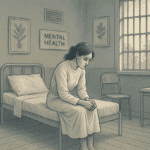Key Takeaways
- There are three main types of mental health treatment centers for teens in Virginia: inpatient, outpatient, and residential.
- Techniques like CBT, DBT, and EMDR are commonly used to help teens.
- Consider location, accreditation, and insurance when selecting a treatment center.
- Mission Prep Healthcare is a top choice for comprehensive teen mental health treatment.
Why Choosing the Right Center Matters
Choosing the right mental health treatment center for your teen is one of the most important decisions you will make. The right environment can make a significant difference in their recovery journey. It ensures they receive the appropriate care customized to their specific needs, thus increasing the likelihood of a successful outcome.
Mission Prep Healthcare specializes in mental health treatment for teens aged 12-17, offering residential and outpatient programs for anxiety, depression, trauma, and mood disorders. Our therapies include CBT, DBT, EMDR, and TMS, tailored to each adolescent’s needs.
With a structured, supportive environment, we integrate academic support and family involvement to promote lasting recovery. Our goal is to help teens build resilience and regain confidence in their future.
Types of Teen Mental Health Treatment Centers
Inpatient Facilities
Inpatient facilities are for teens who require immediate and intensive care. These centers provide 24/7 supervision and support, making them ideal for adolescents experiencing severe mental health crises. Inpatient treatment typically involves a short stay to stabilize the teen’s condition and prepare them for the next step in their recovery journey.
During their stay, teens receive a range of therapeutic interventions such as medication management, individual therapy, and group counseling sessions customized to their specific needs. The goal is to create a safe environment where teens can begin to address their mental health challenges with the support of trained professionals.
Outpatient Programs
Outpatient programs offer a more flexible approach to mental health treatment, allowing teens to receive care while continuing to live at home. These programs are ideal for adolescents who require support but do not need the intensive supervision provided by inpatient facilities. Outpatient treatment can range from a few hours a week to more intensive daily sessions, depending on the teen’s needs.
One major benefit of outpatient programs is their ability to integrate treatment into the teen’s daily life. This helps adolescents apply the skills they learn in therapy to real-world situations, fostering a smoother transition to recovery. For example, a teen struggling with anxiety may attend weekly therapy sessions and participate in a social skills group to practice managing their symptoms in social situations.
Residential Treatment Centers
Residential treatment centers provide a structured, therapeutic environment for teens who need more intensive support than outpatient programs can offer. These centers are ideal for adolescents who require long-term care to address complex mental health challenges.
Residential treatment centers combine the benefits of inpatient care with the flexibility of outpatient programs, offering a comprehensive approach to recovery.
Techniques Used in Teen Treatment
Various therapeutic techniques are employed in teen mental health treatment to address the unique needs of adolescents. These techniques are evidence-based and have been proven effective in helping teens overcome their mental health challenges.
Cognitive Behavioral Therapy (CBT)
Cognitive Behavioral Therapy (CBT), is a widely used technique in teen mental health treatment. During CBT sessions, teens work with a therapist to identify unhelpful thoughts and beliefs. They then learn strategies to challenge and reframe these thoughts, replacing them with more positive and constructive alternatives.
This process empowers teens to take control of their mental health and make meaningful changes in their lives.
Dialectical Behavior Therapy (DBT)
Dialectical Behavior Therapy, or DBT, is another effective therapeutic technique used in teen mental health treatment. Originally developed to treat borderline personality disorder, DBT has since been adapted to help adolescents struggling with a range of mental health issues, including depression, anxiety, and self-harm behaviors.
DBT focuses on teaching teens skills in four key areas: mindfulness, distress tolerance, emotion regulation, and interpersonal effectiveness. These skills empower teens to manage their emotions more effectively, tolerate distressing situations, and improve their relationships with others.
Eye Movement Desensitization and Reprocessing (EMDR)
Eye Movement Desensitization and Reprocessing (EMDR) is a therapeutic technique particularly effective for teens who have experienced trauma. EMDR helps individuals process traumatic memories by using guided eye movements or other forms of bilateral stimulation.
This process reduces the emotional charge associated with traumatic memories, allowing teens to heal from past experiences.
Transcranial Magnetic Stimulation (TMS)
Transcranial Magnetic Stimulation (TMS) is a non-invasive procedure that uses magnetic fields to stimulate nerve cells in the brain, which can help improve mood and alleviate symptoms of depression. This technique is particularly beneficial for teens who have not responded well to traditional treatments like medication and therapy.
While TMS is not suitable for everyone, it is a promising alternative for those seeking a different approach to managing their mental health. As with any treatment, consult with a mental health professional to determine if TMS is the right option for your teen.
How to Choose the Right Teen Mental Health Treatment Center
Range of Therapeutic Approaches
A diverse range of therapeutic approaches ensures that the treatment plan can be customized to your teen’s specific needs. Look for centers that offer a combination of evidence-based therapies, such as CBT, DBT, and EMDR, to provide a comprehensive treatment experience.
Location and Accessibility
When selecting a treatment center, consider its location and accessibility. A center close to home may offer convenience and ease of access. This way, you can remain involved in your teen’s treatment process. But sometimes a change of environment can be beneficial, especially if a more specialized level of care is not available locally.
For example, we have a residential teen mental health facility in Waterford, Virginia. This facility has 24-hour nursing staff, a low 3:1 staff ratio for personalized care, outdoor area for equine therapy (horseback riding), and many other features that foster recovery and overall well being.
Feedback and Success Stories
Feedback from other families and success stories can provide valuable insights into the effectiveness of a treatment center. Testimonials and reviews can offer a glimpse into the experiences of other teens and their families, helping you gauge the center’s ability to meet your teen’s needs.
At Mission Prep Healthcare, we conducted a patient satisfaction survey to evaluate our mental health programs. In 2024, we scored 81% or higher across multiple metrics, which shows that our clients are satisfied with our services.
Insurance and Financial Considerations
Check with your insurance provider to determine what services are covered and what out-of-pocket expenses you may incur. Some centers like us at Mission Prep Healthcare offer sliding scale fees or financial assistance programs to help make treatment more accessible.
Have a clear understanding of the costs involved and go through all available options to ensure your teen receives the care they need without causing undue financial strain on your family.
Accreditation and Licensing
Accreditation and licensing are critical factors to consider when choosing a mental health treatment center. Accredited centers have met rigorous standards of care and are regularly evaluated to ensure they maintain high-quality services. Licensing indicates that the center complies with state regulations and employs qualified professionals to provide treatment.
At Mission Prep Healthcare, all our facilities are accredited by The Joint Commission and the National Association of Addiction Treatment Providers.
Mission Prep Healthcare: Top Choice
Unique Offerings and Facilities
Located in Virginia and California, Mission Prep Healthcare provides a serene and supportive environment conducive to healing and recovery. Our facilities can cater specifically to the needs of adolescents, ensuring they feel comfortable and safe throughout their treatment journey.
In addition to the standard amenities, Mission Prep Healthcare offers specialized programs (e.g., art therapy, mindfulness practices, and outdoor adventure activities) that address the diverse needs of teens. Teenagers can use these alternative ways to express themselves and try out new interests, enhancing their overall treatment experience.
Comprehensive Treatment Approach
Mission Prep Healthcare adopts a comprehensive treatment approach, integrating various evidence-based therapies to address the multifaceted nature of mental health challenges.
The center’s team of licensed professionals collaborates to develop individualized treatment plans customized to each teen’s unique needs. By combining therapies such as CBT, EMDR, and family therapy, we provide a well-rounded treatment experience that empowers teens to achieve long-term recovery and resilience.
Family Support and Involvement
At Mission Prep Healthcare, we recognize that healing is a collaborative effort and encourages families to actively participate in their teen’s recovery journey. Family therapy sessions are a key part of the program, helping to strengthen family dynamics and improve communication.
By creating a strong support network, we ensure that teens and their families are well-equipped to manage the challenges of mental health recovery together.
At Mission Prep Healthcare, we understand the complex nature of adolescent mental health challenges and have developed a comprehensive approach that addresses the entire family system.
If your child is struggling with anxiety, depression, trauma, or other mental health challenges, we’re here to help. We accept most major insurance plans and will work with you to make treatment accessible.
Your teen’s mental health journey doesn’t have to be faced alone. Contact us today and take the first step toward a healthier future for your family.
Frequently Asked Questions (FAQ)
What are the common signs that my teen might need a mental health treatment center?
Common signs that a teen might need a mental health treatment center include significant changes in mood or behavior, withdrawal from friends and family, declining academic performance, and expressions of hopelessness or self-harm. If you notice these signs, seek professional help to determine the best course of action.
How do residential treatment centers differ from inpatient facilities?
Residential treatment centers provide long-term care in a structured, therapeutic environment, while inpatient facilities offer short-term, intensive care for teens in crisis. Residential centers focus on helping teens develop the skills and coping mechanisms needed for long-term recovery, whereas inpatient facilities prioritize stabilization and crisis management.
Does insurance typically cover mental health treatment centers for teens?
Insurance coverage for teen mental health treatment centers varies depending on the provider and the specific policy. Many insurance plans cover at least a portion of the costs for mental health treatment, including inpatient, outpatient, and residential care.
What makes Mission Prep Healthcare different from other treatment centers?
At Mission Prep Healthcare, we offer individualized treatment plans developed by our team of licensed professionals, focusing on both immediate mental health needs and long-term resilience. Our state-of-the-art treatment facility in Virginia provides a serene, supportive environment specifically designed for adolescents to feel safe throughout their healing journey.





















